Just In
- 3 hrs ago

- 6 hrs ago

- 7 hrs ago

- 10 hrs ago

Don't Miss
- Sports
 GT vs DC, IPL 2024: Third Umpire Confused! - Rishabh Pant Unusual Stumping Makes It Tricky Call For Official
GT vs DC, IPL 2024: Third Umpire Confused! - Rishabh Pant Unusual Stumping Makes It Tricky Call For Official - Education
 SCCL Recruitment 2024; Application process, Selection criteria and more
SCCL Recruitment 2024; Application process, Selection criteria and more - Movies
 I Am: Celine Dion OTT Release Date, Platform: When & Where To Watch Irene Taylor's Documentary On Prime Video
I Am: Celine Dion OTT Release Date, Platform: When & Where To Watch Irene Taylor's Documentary On Prime Video - Finance
 1:2 Split: Rs 220-To-3,720, Defence PSU HAL Rises 1561% Post Covid, 440% Dividend Paid; 3 Brokerages Say BUY
1:2 Split: Rs 220-To-3,720, Defence PSU HAL Rises 1561% Post Covid, 440% Dividend Paid; 3 Brokerages Say BUY - News
 Lok Sabha Elections 2024: Ghulam Nabi Azad To Withdraw Candidature From Anantnag-Rajouri Seat
Lok Sabha Elections 2024: Ghulam Nabi Azad To Withdraw Candidature From Anantnag-Rajouri Seat - Automobiles
 Mahindra 3XO SUV Latest Teaser Reveals Connected Car Tech: All Details Here
Mahindra 3XO SUV Latest Teaser Reveals Connected Car Tech: All Details Here - Technology
 OnePlus 13 Early Leak Hints at a Revamped Camera Island, and Fast Charging to Remain at 100W
OnePlus 13 Early Leak Hints at a Revamped Camera Island, and Fast Charging to Remain at 100W - Travel
 From Coconut Breaking on Head to Men Dressing as Women: 12 Unique Indian Rituals Explored
From Coconut Breaking on Head to Men Dressing as Women: 12 Unique Indian Rituals Explored
Coconut Oil: Nutritional Health Benefits, Side Effects And Recipe
Coconut oil is an edible oil consumed in various households across the world. The oil is extracted from the kernel of mature coconuts. The two main varieties of coconut oil include copra oil and virgin coconut oil [1] .
The edge that coconut oil has over cooking oils containing long-chain fatty acids is that coconut oil, especially virgin coconut oil (VCO), is rich in medium-chain fatty acids. This fact makes it a functional food that can be considered to offer various health benefits [2] .
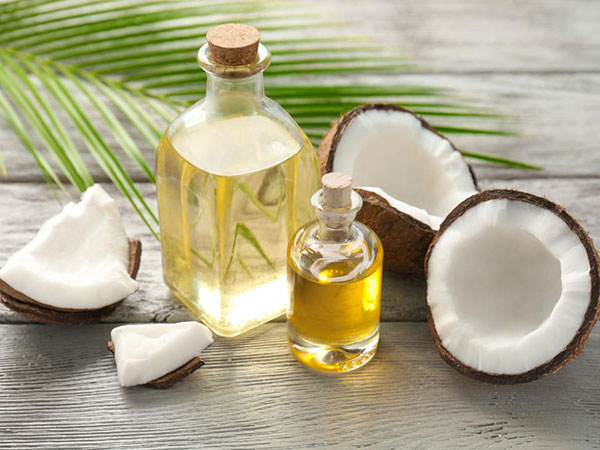
Nutritional Value Of Coconut Oil
100 grams of coconut oil contain 0.03 g water, 892 kcal (energy) and they also contain
- 99.06 g fat
- 1 mg calcium
- 0.05 mg iron
- 0.02 mg zinc
- 0.11 mg Vitamin E
- 0.6 µg Vitamin K

Health Benefits Of Coconut Oil
There are certain benefits of consuming coconut oil, particularly the organic variety.
1. Helps in reducing abdominal fat
For years, coconut has been known to be an appetite suppressant. Added to this quality of reducing appetite is its ability to burn fat. Both of these combine to make it a potent tool for burning fat in your body, especially the hard to dislodge fat deposits around your waist.
2. Boosts immunity
Coconut oil, rich in fatty acids, has been known as a potent immunity booster as well [3] . Fatty acids have been proven to have many effects on immune cells. As structural components of cell membranes, source of energy and ability to signal molecules, fatty acids directly influence immune cell activation [4] .
3. Balances hormones in women
The medium chain fatty acids that are found in coconut are responsible for boosting the metabolism of the human body when consumed. A better metabolism leads to improvement in the functioning of the cells and hormones in the body.
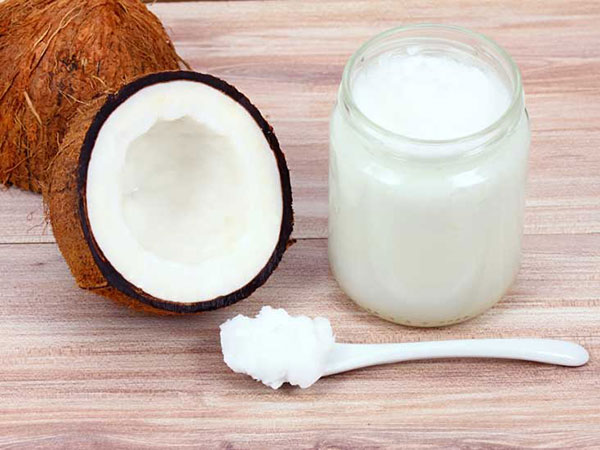
4. Improves bone health
Free radicals, along with oxidative stress, have been known to play a crucial role in the onset of osteoporosis. It is for this reason that antioxidants have been recommended for the prevention and treatment of osteoporosis.
Clinical trials on rats have proved that virgin coconut oil greatly improves bone structure, preventing osteoporosis to a great extent. This can be attributed to the presence of a high amount of anti-oxidative polyphenols in VCO [5] .
5. Prevents diabetics
Obesity is closely connected with a number of related conditions such as insulin resistance (IR), diabetes, heart disease, hypertension, and non-alcoholic fatty liver disease. Together, these are referred to as the Metabolic Syndrome. While there are a number of contributing factors, diet is probably the most relevant of them all [6] .
There is indeed much evidence to suggest that saturated fat from coconut oil might be beneficial in the prevention as well as cure of diabetes, along with having a similar effect on the other conditions included in the Metabolic Syndrome [7] .
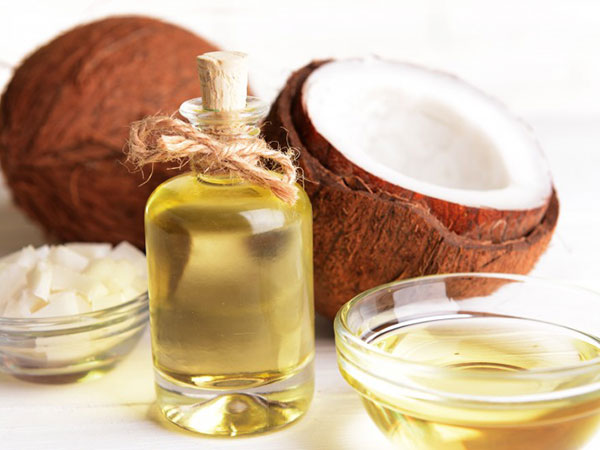
6. Prevents high blood pressure
An increase in blood pressure or hypertension is a leading cause of atherosclerosis or build-up of plaque in arteries, coronary heart disease, and stroke. Hypertension has been seen to be caused to a great extent, by an unhealthy lifestyle [7] .
Consumption of coconut oil, especially virgin coconut oil, improves antithrombotic effect connected with a low cholesterol level and inhibits platelet coagulation [8] .
7. Raises HDL cholesterol
Coconut oil is believed to be able to increase the good HDL in your body, at the same time turning the bad LDL into a less harmful form.
8. Improves digestion
Consumption of coconut oil improves digestion. The medium chain fatty acids in coconut oil help in promoting digestion and decomposition of lipids, by improving the fat metabolism and thereby reducing the deposition of fat at different places in the body [9] .

9. Good for hair, skin and teeth
Some benefits of coconut oil can be derived even without consuming the oil. It is generally believed that coconut oil offers numerous health benefits. Improving the basic health as well as the overall appearance of your hair and skin, topical application of coconut oil has been seen to reduce symptoms of various skin diseases, such as eczema. Application of coconut oil on the skin has also been seen to have a moisturizing effect.
Hair damage can be prevented to a certain extent by applying coconut oil. It also works as a mild sunscreen and can block around 20% of the harmful UV rays of the sun.
In the field of dentistry, coconut oil can be used as a mouthwash as part of the process referred to as oil pulling. The oil pulling process is generally believed to improve dental health by reducing bad breath and killing the harmful bacteria within the mouth.
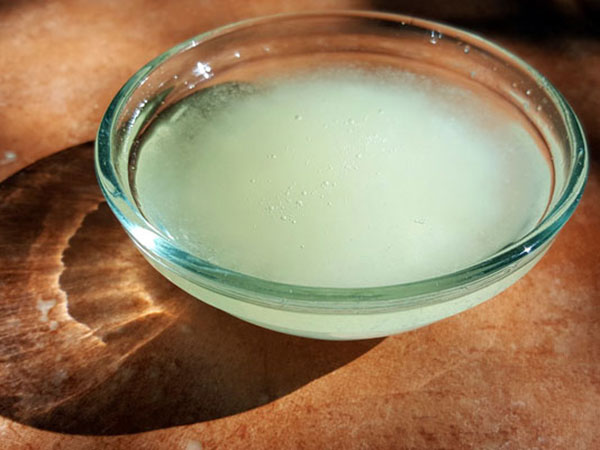
10. Improves liver health
Obesity has been on a rise globally, known to be closely associated with glucose intolerance, cardiovascular disease, low-grade inflammation, as well as liver damage [10] . Certain dietary changes have been seen to control obesity, also treating the linked disorders as well by association.
Coconut oil, especially virgin coconut oil (VCO), has been seen to lower serum glucose and lipid levels, improve glucose tolerance, as well as decrease hepatic steatosis or accumulation of fat in the liver, leading to a condition commonly referred to as "fatty liver" [11] . However, as the clinical trials were conducted on mice, much work is still to be done to establish the health benefits on human liver.
11. Treats fungal infections
Clinical trials have established that coconut oil, at 100% concentration, is more effective than fluconazole in treating fungal infections caused by Candida.
With recently emerging species of Candida that are drug-resistant, coconut oil can be effectively used for treating fungal infections [12] .
Side Effects Of Coconut Oil
In addition to the various benefits generally claimed for coconut oil, there have been certain side effects witnessed as well.
1. Leads to weight gain
Rich in saturated fatty acids, coconut, either whole or as an oil, should be consumed in moderation.
Amidst heightened consumer interest and widespread media speculation on the beneficial properties of coconut oil consumption, there has been much focus on coconut oil being a potent tool for weight loss. Nevertheless, the fact should be kept in perspective that the media has mainly cited studies with MCT oils in general and not coconut oil in particular [13] .
Further research, specifically long-term clinical trials, are needed to establish an undeniable link between coconut oil and weight loss, that is, if there is indeed a link [14] .
2. Can cause allergy
Quite
mistakenly,
people
with
a
known
allergy
to
nuts
are
commonly
advised
to
stay
clear
of
coconut
as
well.
Nevertheless,
as
the
coconut
(cocos
nucifera)
is
a
fruit
and
not
a
nut
as
such,
it
is
not
right
to
assume
that
someone
would
also
be
allergic
to
coconuts
if
he
has
a
nut
allergy.
Allergic
reactions
to
coconuts,
though
quite
rarely
witnessed,
can
hardly
be
ignored.
The
reported
cases
of
allergic
reactions
to
coconut
have
involved
anaphylactic
reactions
[15]
.
Allergic
reactions
to
coconuts
are
systemic.
Though
rare,
the
risk
of
allergy
has
made
it
necessary
-
in
the
United
States
-
to
clearly
mention
coconut
on
the
ingredient
label.
3. Not a potent antibacterial
Do keep in mind that the properties of refined coconut oil are much different from those of hydrolysed virgin coconut oil (HVCO) or virgin coconut oil (VCO) [16] . Extraction by a cold press method ensures that the fatty acids that work as active components in the oil are not lost in VCO, making it much superior in quality to refined coconut oil.
However, certain clinical trials have revealed that VCO and HVCO are ineffective against some strains of bacteria [17] .
4. Offers very mild protection against the sun
Coconut can hardly qualify as a good sunscreen, blocking merely 20% of the harmful UV rays of the sun [18] .
5. Might cause acne breakout
Monolaurin, derived from lauric acid, comprises about 50% of the total fat content in a coconut. With antibacterial properties, monolaurin can help in the treatment of acne by disintegrating the lipid membrane of the bacteria [19] .
While most people can apply coconut oil as a moisturizer or facial cleanser, it is not recommended for use by people with very oily skin. As coconut oil is highly comedogenic or prone to clog pores, application of coconut oil to the face can make acne much worse for certain people.
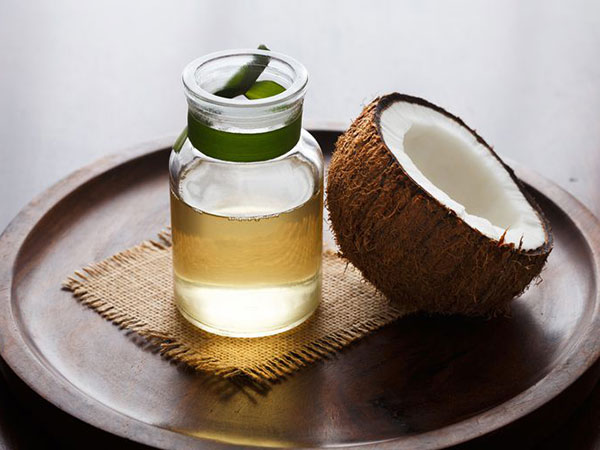
6. May lead to headaches
While
there
are
many
benefits
of
consuming
coconut
oil,
too
much
of
anything
can
be
bad.
Limit
your
daily
intake
of
coconut
oil
to
a
maximum
30
ml
or
two
tablespoons.
Overconsumption
of
coconut
oil
has
been
seen
to
cause
dizziness,
fatigue
as
well
as
headaches.
7. Can cause diarrhoea
As always, moderation is the key. When consumed daily, even by healthy individuals, coconut oil can cause various gut problems including diarrhoea.
Diarrhoea, with an upset stomach and loose stools, is often witnessed as the most common side effect of coconut oil consumption. This can be attributed to the change in the gut bacteria or the sugars found in the oil pulling a lot of water into your gut.
8. Might cause skin irritation when applied to open wounds
Known for its anti-inflammatory property, coconut oil can be effectively used to cure minor skin troubles.
Nevertheless, it must be kept in mind that coconut oil should only be applied to intact skin. When applied to open wounds, coconut oil might lead to itching, redness as well as skin irritation.
Healthy Coconut Oil Recipe
Napa cabbage salad with coconut oil dressing
Ingredients [20]
- 1 tablespoon fresh grated ginger
- 1 tablespoon soy sauce
- 1 tablespoon miso paste
- 2 tablespoons coconut vinegar
- 3 tablespoons fresh squeezed orange juice
- 1/2 cup coconut oil
- 12 pieces wonton wrappers
- 3/4 cup thinly sliced scallions
- 1 Napa Cabbage - 8 to 10 cups, thinly sliced
- 2 cups sugar snap peas - chopped
- 1 ½ cups oranges
Directions
- Heat the coconut oil in the microwave until it melts.
- Mix ginger, soy sauce, miso paste, orange juice and coconut vinegar in a small bowl.
- To the mixture above, mix the liquid coconut oil vigorously.
- Set this aside.
- Use a knife to remove the rind of the oranges. Cut along the membrane walls using a sharp paring knife to get a wedge of orange.
- Take a large bowl, add the thinly sliced Napa cabbage, oranges and sugar snap peas.
- Drizzle the dressing and toss well. Keep it aside.
- Cut about 12 wonton wrappers into strips of ¼ inches and keep them separate.
- In a heated pan, add about 1/4th cup coconut oil, once the oil has heated well, add the wonton wrappers. Keep tossing continuously so that it does not get burnt.
- Once they have turned brown, remove them in a paper towel and sprinkle some salt.
- Top the prepared salad mixture with scallions and fried wonton wrappers.
- [1] Wallace, T. C. (2019). Health Effects of Coconut Oil—A Narrative Review of Current Evidence.Journal of the American College of Nutrition,38(2), 97-107.
- [2] Ghani, N. A. A., Channip, A. A., Chok Hwee Hwa, P., Ja'afar, F., Yasin, H. M., & Usman, A. (2018). Physicochemical properties, antioxidant capacities, and metal contents of virgin coconut oil produced by wet and dry processes.Food science & nutrition,6(5), 1298-1306.
- [3] Chinwong, S., Chinwong, D., & Mangklabruks, A. (2017). Daily Consumption of Virgin Coconut Oil Increases High-Density Lipoprotein Cholesterol Levels in Healthy Volunteers: A Randomized Crossover Trial.Evidence-based complementary and alternative medicine : eCAM,2017, 7251562.
- [4] Lappano, R., Sebastiani, A., Cirillo, F., Rigiracciolo, D. C., Galli, G. R., Curcio, R., … Maggiolini, M. (2017). The lauric acid-activated signaling prompts apoptosis in cancer cells.Cell death discovery,3, 17063.
- [5] Yaqoob, P., & Calder, P. C. (2007). Fatty acids and immune function: new insights into mechanisms.British Journal of Nutrition,98(S1), S41-S45.
- [6] Hayatullina, Z., Muhammad, N., Mohamed, N., & Soelaiman, I. N. (2012). Virgin coconut oil supplementation prevents bone loss in osteoporosis rat model.Evidence-Based Complementary and Alternative Medicine,2012.
- [7] Deol, P., Evans, J. R., Dhahbi, J., Chellappa, K., Han, D. S., Spindler, S., & Sladek, F. M. (2015). Soybean oil is more obesogenic and diabetogenic than coconut oil and fructose in mouse: potential role for the liver.PloS one,10(7), e0132672.
- [8] Deol, P., Evans, J. R., Dhahbi, J., Chellappa, K., Han, D. S., Spindler, S., & Sladek, F. M. (2015). Soybean oil is more obesogenic and diabetogenic than coconut oil and fructose in mouse: potential role for the liver.PloS one,10(7), e0132672.
- [9] Nurul-Iman, B. S., Kamisah, Y., Jaarin, K., & Qodriyah, H. M. S. (2013). Virgin coconut oil prevents blood pressure elevation and improves endothelial functions in rats fed with repeatedly heated palm oil.Evidence-Based Complementary and Alternative Medicine,2013.
- [10] Nurul-Iman, B. S., Kamisah, Y., Jaarin, K., & Qodriyah, H. M. S. (2013). Virgin coconut oil prevents blood pressure elevation and improves endothelial functions in rats fed with repeatedly heated palm oil.Evidence-Based Complementary and Alternative Medicine,2013.
- [11] Wang, J., Wang, X., Li, J., Chen, Y., Yang, W., & Zhang, L. (2015). Effects of Dietary Coconut Oil as a Medium-chain Fatty Acid Source on Performance, Carcass Composition and Serum Lipids in Male Broilers.Asian-Australasian journal of animal sciences,28(2), 223–230.
- [12] Zicker, M. C., Silveira, A. L. M., Lacerda, D. R., Rodrigues, D. F., Oliveira, C. T., de Souza Cordeiro, L. M., ... & Ferreira, A. V. M. (2019). Virgin coconut oil is effective to treat metabolic and inflammatory dysfunction induced by high refined carbohydrate-containing diet in mice.The Journal of nutritional biochemistry,63, 117-128.
- [13] Woteki, C. E., & Thomas, P. R. (1992). Making The Change To The New Eating Pattern. InEat for Life: The Food and Nutrition Board's Guide to Reducing Your Risk of Chronic Disease. National Academies Press (US).
- [14] Clegg, M. E. (2017). They say coconut oil can aid weight loss, but can it really?.European journal of clinical nutrition,71(10), 1139.
- [15] Clegg, M. E. (2017). They say coconut oil can aid weight loss, but can it really?.European journal of clinical nutrition,71(10), 1139.
- [16] Anagnostou, K. (2017). Coconut Allergy Revisited.Children,4(10), 85.
- [17] Hon, K. L., Kung, J. S. C., Ng, W. G. G., & Leung, T. F. (2018). Emollient treatment of atopic dermatitis: latest evidence and clinical considerations.Drugs in context,7.
- [18] Hon, K. L., Kung, J. S. C., Ng, W. G. G., & Leung, T. F. (2018). Emollient treatment of atopic dermatitis: latest evidence and clinical considerations.Drugs in context,7.
- [19] Korać, R. R., & Khambholja, K. M. (2011). Potential of herbs in skin protection from ultraviolet radiation.Pharmacognosy reviews,5(10), 164.
- [20] Thedevilwearsparsley. (n.d). Coconut oil recipes [Blog post]. Retrieved from https://www.thedevilwearsparsley.com/2017/02/27/coconut-citrus-salad/
-
 beautyThis Natural Ingredient Can Do More Harm Than Good On Your Skin, Especially Oily Skin
beautyThis Natural Ingredient Can Do More Harm Than Good On Your Skin, Especially Oily Skin -
 healthSay Farewell to Stretch Marks the Natural Way - Try These Remedies!
healthSay Farewell to Stretch Marks the Natural Way - Try These Remedies! -
 beautyNatural Remedies For Hair Loss: Amla, Coconut Oil And Hibiscus; Try It Today!
beautyNatural Remedies For Hair Loss: Amla, Coconut Oil And Hibiscus; Try It Today! -
 beautyFlaxseed And Coconut Oil For Hair Loss: Try This 10-Day Hair Care Routine Today!
beautyFlaxseed And Coconut Oil For Hair Loss: Try This 10-Day Hair Care Routine Today! -
 beautyUnlock The Power Of Coconut Oil And Jeera For Hair Loss: Try This Hair Pack Today!
beautyUnlock The Power Of Coconut Oil And Jeera For Hair Loss: Try This Hair Pack Today! -
 beautySkincare: What Happens When You Mix Coconut Oil And Turmeric?
beautySkincare: What Happens When You Mix Coconut Oil And Turmeric? -
 beautyUse This One Ingredient For Dry Lips And Smelly Armpits
beautyUse This One Ingredient For Dry Lips And Smelly Armpits -
 beautyCoconut Oil And Mustard Oil Combo For Hair Fall
beautyCoconut Oil And Mustard Oil Combo For Hair Fall -
 hair careDeepika Padukone Haircare Tips: Simple Coconut Oil Massage Is THE Solution For Dry, Weak Hair
hair careDeepika Padukone Haircare Tips: Simple Coconut Oil Massage Is THE Solution For Dry, Weak Hair -
 hair careSay Goodbye To Your Hair Worries With Egg And Coconut Based Hair Masks
hair careSay Goodbye To Your Hair Worries With Egg And Coconut Based Hair Masks -
 body care7 Awesome And Easy Ways Of Treating Problems Associated With Dry Skin In Winters
body care7 Awesome And Easy Ways Of Treating Problems Associated With Dry Skin In Winters -
 wellnessWorld Coconut Day 2022: 33 Different Uses Of Coconut Oil - Benefits, Allergies And How Much To Consume Per Day
wellnessWorld Coconut Day 2022: 33 Different Uses Of Coconut Oil - Benefits, Allergies And How Much To Consume Per Day


 Click it and Unblock the Notifications
Click it and Unblock the Notifications



